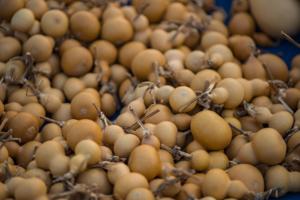Introduction
Tomato plants are a popular choice for home gardeners and commercial growers alike due to their delicious taste and versatility in cooking. However, to get the most out of your tomato plants, it is essential to understand the nutrients they need to thrive. In this article, we will explore whether phosphorus is good for tomato plants.
The Importance of Phosphorus for Tomato Plants
Phosphorus is a crucial nutrient for all plants, including tomatoes. It plays a vital role in various plant processes, including energy transfer, photosynthesis, and root development. Tomato plants require adequate amounts of phosphorus to grow healthy and produce abundant yields. Without enough phosphorus, tomato plants may have stunted growth and weaker root systems, resulting in poor plant health and lower yields.
How Phosphorus Affects Tomato Plants
Phosphorus affects tomato plants in several ways. Firstly, it helps to improve the growth and development of the roots, making them stronger and better able to absorb nutrients and water from the soil. This, in turn, helps the plant to develop a stronger stem and produce more extensive foliage. Secondly, phosphorus plays a vital role in photosynthesis, helping the plant to convert light into energy. Finally, the nutrient helps the plant to develop and produce flowers and fruit. Without adequate phosphorus, tomato plants may produce fewer and smaller fruits, impacting the yield.
Sources of Phosphorus for Tomato Plants
There are various sources of phosphorus that gardeners can use to ensure their tomato plants receive adequate nutrients. One of the best sources is through the use of fertilizers. Fertilizers containing phosphorus are widely available and can be applied directly to the soil around tomato plants. Alternatively, gardeners can amend the soil with rock phosphate to provide a long-lasting source of phosphorus that will feed the plants over an extended period. Other sources of phosphorus include compost, bone meal, and fish meal.
The Risks of Overusing Phosphorus
While phosphorus is essential for the growth and development of tomato plants, overusing it can be detrimental to plant health and the environment. Too much phosphorus can lead to an excess of nutrients in the soil, which can harm the plant's ability to absorb other essential micronutrients. Additionally, excess phosphorus can leach into the groundwater, leading to water pollution and environmental damage. Therefore, it is crucial to use phosphorus in moderation and only when necessary.
Conclusion
Phosphorus is a valuable nutrient for tomato plants, playing a critical role in their growth and development. By understanding the importance of phosphorus, gardeners can provide their tomato plants with the nutrients they need to produce healthy foliage, abundant blooms, and delicious fruits. However, it is essential to use phosphorus in moderation and to be mindful of the risks of overuse. With the right amount of phosphorus and careful attention to plant health, gardeners can enjoy bountiful harvests of delicious tomatoes year after year.

 how many times do yo...
how many times do yo... how many planted tre...
how many planted tre... how many pine trees ...
how many pine trees ... how many pecan trees...
how many pecan trees... how many plants comp...
how many plants comp... how many plants can ...
how many plants can ... how many plants and ...
how many plants and ... how many pepper plan...
how many pepper plan...































